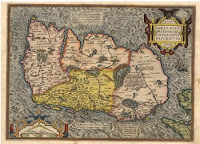With us there was a doctor of physic;
In all this world was none like him to pick
For talk of medicine and surgery;
For he was grounded in astronomy. —Prologue to the Canterbury Tales
 |
| Doctor, from the Ellesmere MS. |
John of Gaddesden (c.1280-1361) was a "Doctor of Physik" who was quite well-known in his day, so much so that modern scholars looking to find analogs for the characters in Chaucer's
Canterbury Tales have suggested he is the likeliest candidate for Chaucer's "doctor of physic." As a fan of both Chaucer and historical detail, I'm going to weigh in and say . . . maybe.
Who was Gaddesden, and why was he considered the model for Chaucer's pilgrim? For one thing, he had written
Rosa medicinæ (The rose of medicine; sometimes called the
Rosa Anglicæ), a compendium of medical information called so because it was in five parts, like the five sepals of a rose. In it, he quotes numerous authorities from the past; Chaucer's list of authorities with whom his doctor is familiar lines up nicely with Gaddesden's sources. Also, Gaddesden had a reputation for charging high fees, and Chaucer makes it clear that his doctor loved gold.
To be honest, however, Gaddesden's book was quoting the same authorities that anyone would quote when compiling a book on medicine. It was completely unoriginal. Even his title seems derivative, probably based on
Lilium medicinæ (the Lily of medicine) by Bernard Gordon, produced at Montpellier in 1303. Gordon, a Scotsman, was one of the teachers of
Guy de Chauliac. Chauliac, in turn, taught Gaddesden. What did Chauliac think of his student's work? Not much; he said of it:
Last of all arose the scentless rose of England, in which, on its being sent to me, I
hoped to find the odor of sweet originality, but instead of that I
encountered only the fictions of Hispanus, of Gilbert, and of
Theodoric.
Those who write about Gaddesden being Chaucer's doctor usually justify it also be calling them "contemporaries." Let's look at the timeline: the
Canterbury Tales probably wasn't started until 1387. Even if the Prologue were the first thing he wrote—highly unlikely—this was a quarter century after Gaddesden's death; a death that would have taken place when Chaucer was about 20 years old and had been connected to the household of Prince Lionel, the second son of King Edward III, only for a few years. Gaddesden seems to have been attached to the household of Edward, the Black Prince, who would have spent much of Gaddesden's later years on the continent while Chaucer was in England.
They
could have crossed paths, but probably not significantly, and Gaddesden would have been long out of the public eye and consciousness when Chaucer came into his own as a poet. For Chaucer to write up a physician who quoted historical authorities, knew astrology, and loved gold probably just meant that he had met typical physicians.













